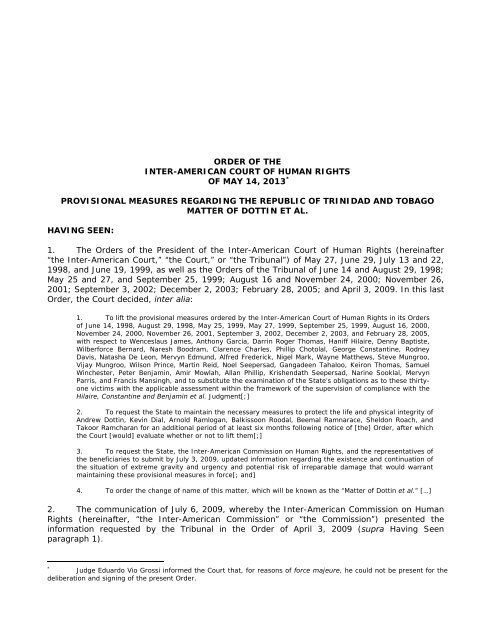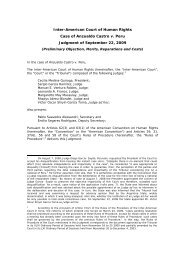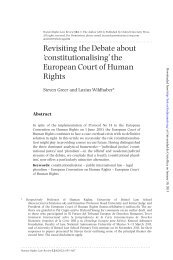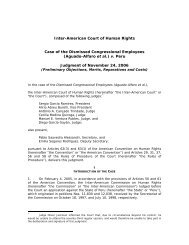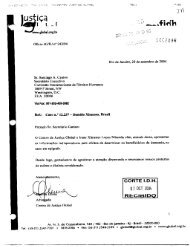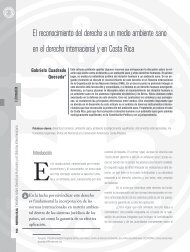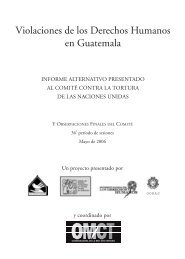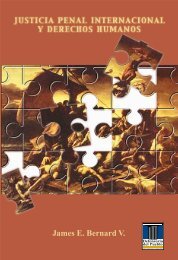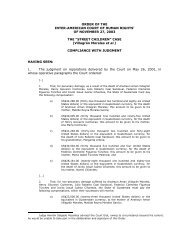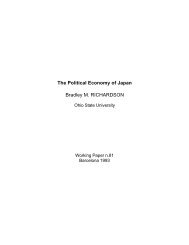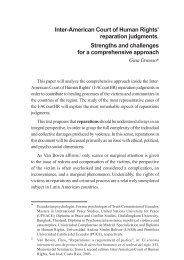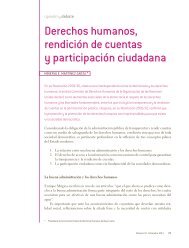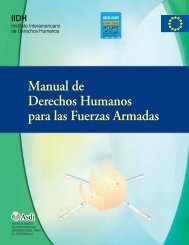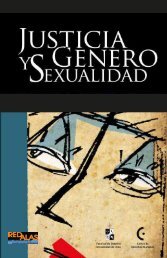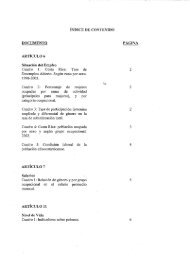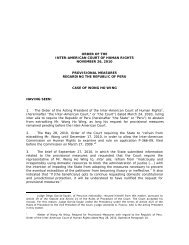Page 1 ORDER OF THE INTER-AMERICAN COURT OF HUMAN ...
Page 1 ORDER OF THE INTER-AMERICAN COURT OF HUMAN ...
Page 1 ORDER OF THE INTER-AMERICAN COURT OF HUMAN ...
Create successful ePaper yourself
Turn your PDF publications into a flip-book with our unique Google optimized e-Paper software.
<strong>ORDER</strong> <strong>OF</strong> <strong>THE</strong><strong>INTER</strong>-<strong>AMERICAN</strong> <strong>COURT</strong> <strong>OF</strong> <strong>HUMAN</strong> RIGHTS<strong>OF</strong> MAY 14, 2013 *PROVISIONAL MEASURES REGARDING <strong>THE</strong> REPUBLIC <strong>OF</strong> TRINIDAD AND TOBAGOMATTER <strong>OF</strong> DOTTIN ET AL.HAVING SEEN:1. The Orders of the President of the Inter-American Court of Human Rights (hereinafter“the Inter-American Court,” “the Court,” or “the Tribunal”) of May 27, June 29, July 13 and 22,1998, and June 19, 1999, as well as the Orders of the Tribunal of June 14 and August 29, 1998;May 25 and 27, and September 25, 1999; August 16 and November 24, 2000; November 26,2001; September 3, 2002; December 2, 2003; February 28, 2005; and April 3, 2009. In this lastOrder, the Court decided, inter alia:1. To lift the provisional measures ordered by the Inter-American Court of Human Rights in its Ordersof June 14, 1998, August 29, 1998, May 25, 1999, May 27, 1999, September 25, 1999, August 16, 2000,November 24, 2000, November 26, 2001, September 3, 2002, December 2, 2003, and February 28, 2005,with respect to Wenceslaus James, Anthony Garcia, Darrin Roger Thomas, Haniff Hilaire, Denny Baptiste,Wilberforce Bernard, Naresh Boodram, Clarence Charles, Phillip Chotolal, George Constantine, RodneyDavis, Natasha De Leon, Mervyn Edmund, Alfred Frederick, Nigel Mark, Wayne Matthews, Steve Mungroo,Vijay Mungroo, Wilson Prince, Martin Reid, Noel Seepersad, Gangadeen Tahaloo, Keiron Thomas, SamuelWinchester, Peter Benjamin, Amir Mowlah, Allan Phillip, Krishendath Seepersad, Narine Sooklal, MervynParris, and Francis Mansingh, and to substitute the examination of the State’s obligations as to these thirtyonevictims with the applicable assessment within the framework of the supervision of compliance with theHilaire, Constantine and Benjamin et al. Judgment[;]2. To request the State to maintain the necessary measures to protect the life and physical integrity ofAndrew Dottin, Kevin Dial, Arnold Ramlogan, Balkissoon Roodal, Beemal Ramnarace, Sheldon Roach, andTakoor Ramcharan for an additional period of at least six months following notice of [the] Order, after whichthe Court [would] evaluate whether or not to lift them[;]3. To request the State, the Inter-American Commission on Human Rights, and the representatives ofthe beneficiaries to submit by July 3, 2009, updated information regarding the existence and continuation ofthe situation of extreme gravity and urgency and potential risk of irreparable damage that would warrantmaintaining these provisional measures in force[; and]4. To order the change of name of this matter, which will be known as the “Matter of Dottin et al.” […]2. The communication of July 6, 2009, whereby the Inter-American Commission on HumanRights (hereinafter, “the Inter-American Commission” or “the Commission”) presented theinformation requested by the Tribunal in the Order of April 3, 2009 (supra Having Seenparagraph 1).*Judge Eduardo Vio Grossi informed the Court that, for reasons of force majeure, he could not be present for thedeliberation and signing of the present Order.
in all instances in which the Court’s intervention is sought. Likewise, the three conditionsdescribed must persist for the Court to maintain the protection measures ordered. If one of theseconditions is no longer in effect, then the Court must assess the need to continue with theprotection ordered. 55. This Tribunal has previously noted that provisional measures are of an exceptional natureand that they refer to a specific temporal situation. Thus, due to their very nature, they cannotbe perpetuated indefinitely. 6 In light of its jurisdiction, in the context of provisional measures, theCourt must consider only those arguments that are strictly and directly related to the extremegravity and urgency of the situation and the necessity to avoid irreparable damage to persons. Itis in this manner that, in deciding whether to keep the provisional measures in force, the Tribunalmust analyze whether the situation of extreme gravity and urgency that led to the adoption ofsuch measures persists, or whether new circumstances, also extremely grave and urgent,warrant keeping them in force. 7A. Continuance of the situation of extreme gravity and urgency that brought aboutthe present provisional measures6. In the Order of April 3, 2009 (supra Having Seen paragraph 1), the Inter-American Courtdeemed it appropriate to maintain the provisional measures ordered in favor of Andrew Dottin,Kevin Dial, Arnold Ramlogan, Balkissoon Roodal, Beemal Ramnarace, Sheldon Roach, and TakoorRamcharan for an additional period of at least six months. Additionally, to facilitate theassessment of the maintenance of such measures, the Tribunal considered it necessary torequest that the State, the representatives, and the Inter-American Commission submit updatedinformation regarding the existence and continuance of the situation of extreme gravity andurgency and the risk of such persons suffering irreparable harm.7. The Court observes that the State and the representatives did not submit the informationrequired by the Court in the aforementioned Order of April 3, 2009 (supra Having Seenparagraph 1), despite having been asked to submit such information on various occasions (supraHaving Seen paragraph 3). Therefore, in order to evaluate the implementation of the presentprovisional measures and determine the need to maintain them or, if necessary, to lift them, theCourt will analyze the information provided by the Inter-American Commission, as well asinformation of public knowledge that is available to the parties and the Commission.B. Information submitted by the Inter-American Commission8. The Inter-American Commission reported that the death penalties imposed on thebeneficiaries Andrew Dottin, Kevin Dial, Arnold Ramlogan, Beemal Ramnarace, Sheldon Roach,Measures regarding Mexico. Order of the Inter-American Court of Human Rights of February 13, 2013, Considering para.5.5Cf. Case of Carpio Nicolle. Provisional Measures regarding Guatemala. Order of the Inter-American Court ofHuman Rights of July 6, 2009, Considering para. 14, and Matter of Millacura Llaipén et al. Provisional Measures regardingArgentina. Order of the Inter-American Court of Human Rights of February 13, 2013, Considering para. 3.6Cf. Matter of Clemente Teherán et al. (Zenú Indigenous Community). Provisional Measures regarding Colombia.Order of the Inter-American Court of Human Rights of December 1, 2003, Considering para. 3, and Matter of MillacuraLlaipén et al. Provisional Measures regarding Argentina. Order of the Inter-American Court of Human Rights of February13, 2013, Considering para. 8.7Cf. Matter of James et al. Provisional Measures regarding Trinidad and Tobago. Order of the Inter-AmericanCourt of Human Rights of August 29, 1998, Considering para. 6, and Matter of Millacura Llaipén et al. ProvisionalMeasures regarding Argentina. Order of the Inter-American Court of Human Rights of February 13, 2013, Consideringpara. 4.3
and Takoor Ramcharan were “commuted to life imprisonment in a judgment […] by the HighCourt of Justice of […] Trinidad and Tobago dated August 15, 2008.” Additionally, regarding thesituation of Mr. Balkissoon Roodal, the Commission stated that on November 20, 2003, theJudicial Committee of the Privy Council quashed the death penalty imposed on Mr. Roodal andremitted the matter to the aforementioned High Court of Justice so that it could decide, as amatter of discretion, the sentence to be imposed. The Commission submitted both decisions tothe Court. 8C. Considerations of the Court9. The Court recalls that it ordered that the State adopt provisional measures in favor ofAndrew Dottin and Kevin Dial on May 27, 1999, and in favor of Arnold Ramlogan, BalkissoonRoodal, Beemal Ramnarace, Sheldon Roach, and Takoor Ramcharan on November 26, 2001, inorder to prevent the execution of the death penalties imposed on them and in this way, preservetheir lives and physical integrity. 9 In that regard, the Court observes that since 1993, the JudicialCommittee of the Privy Council of the United Kingdom of Great Britain and Northern Ireland(hereinafter, “the Judicial Committee of the Privy Council,” “the Privy Council,” or “the JCPC”),which functions as the court of appeals of last resort for Trinidad and Tobago, 10 and the HighCourt of Justice, one of the two courts that make up the Supreme Court of Judicature of Trinidadand Tobago, 11 have issued a series of decisions that agree with the decisions of the Inter-American Court, in the sense that the death penalty should not be applied to the aforementionedpersons. The Inter-American Court considers it pertinent to now refer to the decisions of the PrivyCouncil and the High Court of Justice.10. First, the Court observes that in the decision issued on November 2, 1993, in the casePratt and Morgan v. The Attorney General for Jamaica and Another, the Judicial Committee of thePrivy Council established that “in any case [in which the death sentence is imposed and] in whichexecution is to take place more than five years after sentence there will be strong grounds forbelieving that the delay is such as to constitute ‘inhuman or degrading punishment or othertreatment.’” 12 Similarly, in its 2006 judgment in the case of Henfield v. Attorney General of theCommonwealth of The Bahamas, the JCPC explained that “the reason why execution [of aperson] following the lapse of a prolonged period of time after sentence of death would constituteinhuman punishment is that the condemned man has suffered the agony of mind of facing the8Cf. Decision issued by Justice Bereaux on August 15, 2008, in H.C.A. No. 1412 of 2005 (file on provisionalmeasures, volume IV, folios 841-843 and 854-856), and Balkissoon Roodal v. The State (Trinidad and Tobago), PrivyCouncil Appeal No. 18 of 2003, judgment issued by the Judicial Committee of the Privy Council on November 20, 2003(file on provisional measures, volume IV, folios 857-907). Available at:http://www.bailii.org/uk/cases/UKPC/2003/78.html.9Cf. Matter of James et al. Provisional Measures regarding Trinidad and Tobago. Order of the Inter-AmericanCourt of Human Rights of May 27, 1999, Operative para. 1, and Matter of James et al. Provisional Measures regardingTrinidad and Tobago. Order of the Inter-American Court of Human Rights of November 26, 2001, Operative para. 2.10Cf. “Role of the JCPC,” Judicial Committee of the Privy Council. Available at: http://www.jcpc.gov.uk/about/roleof-the-jcpc.html.11The Supreme Court of Judicature of Trinidad and Tobago is composed of the Court of Appeal and the High Court.The Constitution of Trinidad and Tobago provides in Article 99 that: “There shall be a Supreme Court of Judicature forTrinidad and Tobago consisting of a High Court of Justice (hereinafter referred to as ‘the High Court’) and a Court ofAppeal with such jurisdiction and powers as conferred on these Courts respectively by this Constitution or any other law.”Cf. “Overview,” Judiciary of the Republic of Trinidad and Tobago. Available at:http://www.ttlawcourts.org/index.php/supreme-court-27/overview.12Cf. Pratt and Morgan v. The Attorney General for Jamaica and another (Jamaica), Privy Council Appeal No. 10 of1993, judgment issued by the Judicial Committee of the Privy Council on November 2, 1993, para. 85. Available at:http://www.bailii.org/uk/cases/UKPC/1993/1.html.4
prospect of execution over that period.” 13 According to the JCPC, the context of a particularcountry’s legal system and the periods anticipated within such country for the conclusion ofappeals processes should be taken into account when establishing if a particular delay, in itsentirety from the time of the imposition of the sentence, constitutes an “inhuman punishment.” 14Unlike in the Jamaican system, in the Bahamas, there is no possibility of application to theHuman Rights Committee of the United Nations, and thus the anticipated period for theconclusion of the appeals process was only two years. Consequently, the Privy Council held thatin that case, a total period of delay of three and a half years was “inordinate.”11. Subsequently, in the judgment issued on November 20, 2003, in the case of BalkissoonRoodal v. The State (supra Considering paragraph 8), the Privy Council established that the“mandatory sentence of death is inconsistent with the international obligations of Trinidad andTobago under the [American] Declaration [of the Rights and Duties of Man].” Therefore, the PrivyCouncil quashed the death penalty imposed on Mr. Balkissoon Roodal, beneficiary of the presentprovisional measures, and remitted the matter to the trial judge to decide, as a matter ofdiscretion, the sentence to be imposed. 15 It should be noted that the JCPC left open thepossibility that Mr. Roodal could be sentenced to death once again.12. However, the following year, the Privy Council reversed its previous position regarding themandatory death penalty in Trinidad and Tobago in the case of Matthew v. The State. 16Nevertheless, the JCPC considered that those persons who had benefitted from its judgment inthe case of Balkissoon Roodal v. The State (supra Considering paragraphs 8 and 11) had, untilthat time, the “expectation” that they would have the opportunity for a hearing regarding theimposition of a discretionary sentence. Therefore, the JCPC considered it fair that the deathpenalties imposed on these persons, including Mr. Roodal, be commuted to sentences of lifeimprisonment. 1713. Moreover, the Court observes that as a result of some statements by the Attorney Generalof the Republic of Trinidad and Tobago before Parliament in 2005, to the effect that the Statewould do “everything within its power” to carry out the sentences of the persons on death row, 18on August 15, 2008, Justice Bereaux, of the High Court of Justice, commuted the sentences ofdeath of Andrew Dottin, Kevin Dial, Takoor Ramcharan, Arnold Ramlogan, Beemal Ramnarace,and Sheldon Roach, all of whom are beneficiaries of the present provisional measures, amongother persons. 1913Cf. Henfield v. Attorney General of the Commonwealth of The Bahamas (Bahamas), Privy Council Appeal Nos.26 y 37 of 1996, judgment issued by the Judicial Committee of the Privy Council on October 14, 1996, para. 9. Availableat: http://www.bailii.org/uk/cases/UKPC/1996/36.html.14Cf. Henfield v. Attorney General of the Commonwealth of The Bahamas (Bahamas), Privy Council Appeal Nos. 26y 37 of 1996, judgment issued by the Judicial Committee of the Privy Council on October 14, 1996, paras. 10 and 11.Available at: http://www.bailii.org/uk/cases/UKPC/1996/36.html.15Cf. Balkissoon Roodal v. The State (Trinidad and Tobago), Privy Council Appeal No. 18 of 2003, judgment issuedby the Judicial Committee of the Privy Council on November 20, 2003, paras. 30-32 and 35 (file on provisional measures,volume IV, folios 857-907). Available at: http://www.bailii.org/uk/cases/UKPC/2003/78.html.16Cf. Matthew v. The State (Trinidad and Tobago), Privy Council Appeal No. 12 of 2004, judgment issued by theJudicial Committee of the Privy Council on July 7, 2004, para. 1. Available at:http://www.bailii.org/uk/cases/UKPC/2004/33.html.17Cf. Matthew v. The State (Trinidad and Tobago), Privy Council Appeal No. 12 of 2004, judgment issued by theJudicial Committee of the Privy Council on July 7, 2004, paras. 30-33. Available at:http://www.bailii.org/uk/cases/UKPC/2004/33.html.18Cf. “In the matter of Section 4 and 5 of the Constitution of the Republic of Trinidad and Tobago Act No. 4 of1976,” decision of the High Court of Justice of August 5, 2010, H.C.A. No. 1412 of 2005, pages 4 and 5. Available at:http://webopac.ttlawcourts.org/LibraryJud/Judgments/HC/rajkumar/2005/hca_05_1412DD5jan2010.pdf.19Cf. Decision issued by Justice Bereaux on August 15, 2008, in H.C.A. No. 1412 of 2005 (file on provisionalmeasures, volume IV, folios 842 and 855).5
14. Subsequently, the beneficiaries Andrew Dottin and Kevin Dial participated in an actionbrought by various people who were on death row at the time the judgment in the Matthew casewas issued. Through its judgment of January 5, 2010, the High Court of Justice confirmed thattheir sentences should be commuted to life imprisonment and indicated that after the issuance ofthe judgments of Pratt and Morgan and Matthew (supra Considering paragraphs 10 and 12), “itwas clear”:(i) that persons on death row after 5 years had elapsed could in most cases not have been executed, (ii) thatthat period may have been abbreviated to 3 1/2 years if appeals to international human rights tribunals were notavailable, (iii) that persons […] on death row as at July 7 th [,] 2004[, the date that the judgment in the Matthewcase was issued,] awaiting execution could not have been executed, (iv) […] [and], (v) that after the order of[…] Justice Bereaux persons who have had their sentences of death commuted to life imprisonment and whohave been removed from death row could not be subject to execution thereafter for the same reasons given inMatthew namely - once an expectation is held out to a prisoner and officially communicated to him that he wouldnot be executed, this cannot be resiled from […]. 2015. The Court recalls that it ordered provisional measures in favor of Andrew Dottin, KevinDial, Arnold Ramlogan, Balkissoon Roodal, Beemal Ramnarace, Sheldon Roach, and TakoorRamcharan “so as not to hinder the processing of [the beneficiaries’] cases before the Inter-American system for the protection of human rights.” 21 In that regard, the Court observes that todate, the Inter-American Commission has not submitted the cases of such persons to the Inter-American Court. Thus, in view of the judgments issued by the court of appeals of last resort inTrinidad and Tobago and by one of the courts that make up the Supreme Court of that State,according to which the death sentences imposed on Andrew Dottin, Kevin Dial, Arnold Ramlogan,Balkissoon Roodal, Beemal Ramnarace, Sheldon Roach, and Takoor Ramcharan have beencommuted, and given the lack of information on the part of the representatives and the Stateconfirming the existence of a situation of extreme gravity and urgency and of risk of suchpersons suffering irreparable harm to their lives or personal integrity, the Court considers itappropriate to lift the provisional measures ordered in the present matter. It is important to note,in this regard, that all the aforementioned persons had reached the periods of 5 and 3.5 years ondeath row after which, “in most cases,” they could not be executed, according to theinterpretation of the High Court of Justice of the judgments issued by the JCPC in the cases ofPratt and Morgan and Henfield (supra Considering paragraphs 10 and 14).16. It is not within the Court’s knowledge whether the cases of the aforementioned personsare still being processed before the Inter-American Commission. In this regard, the Courtreiterates that the denunciation of the Convention by Trinidad and Tobago does not have theeffect of releasing the State from its responsibilities regarding acts that occurred prior to theeffective date of said denunciation (supra Considering paragraph 2). For this reason, despite thelifting of the provisional measures previously ordered, the State is obligated to guarantee therights of the aforementioned persons 22 in the context of the cases that may be progressing beforethe Commission. The lifting of the present provisional measures does not prevent, if it becomesnecessary, a renewed request for the urgent attention of the organs of the Inter-AmericanSystem for the protection of human rights.20“In the matter of Section 4 and 5 of the Constitution of the Republic of Trinidad and Tobago Act No. 4 of 1976,”decision of the High Court of Justice of January 5, 2010, H.C.A. No. 1412 of 2005, pages 37 and 38. Available at:http://webopac.ttlawcourts.org/LibraryJud/Judgments/HC/rajkumar/2005/hca_05_1412DD5jan2010.pdf.21Cf. Matter of James et al. Provisional Measures regarding Trinidad and Tobago. Order of the Inter-AmericanCourt of Human Rights of April 3, 2009, Considering para. 13.22Cf. Case of Gutiérrez Soler v. Colombia. Provisional Measures regarding Colombia. Order of the Inter-AmericanCourt of Human Rights of October 23, 2012, Considering para. 21, and Matter of Millacura Llaipén et al. ProvisionalMeasures regarding Argentina. Order of the Inter-American Court of Human Rights of February 13, 2013, Consideringpara. 18.6
<strong>THE</strong>REFORE:<strong>THE</strong> <strong>INTER</strong>-<strong>AMERICAN</strong> <strong>COURT</strong> <strong>OF</strong> <strong>HUMAN</strong> RIGHTS,in exercise of the attributes conferred on it by Article 63(2) of the American Convention onHuman Rights and Articles 25 and 29 of the Rules of Procedure,DECIDES:1. To lift the provisional measures in favor of Andrew Dottin, Arnold Ramlogan, BalkissoonRoodal, Beemal Ramnarace, Kevin Dial, Sheldon Roach, and Takoor Ramcharan, in conformitywith Considering paragraphs 6 to 16 of the present Order.2. To require the Secretariat of the Court to serve notice of the present Order on theRepublic of Trinidad and Tobago, the Inter-American Commission on Human Rights, and therepresentatives of the beneficiaries.3. To archive the present matter.7
Diego García-SayánPresidentManuel Ventura RoblesAlberto Pérez PérezRoberto de Figueiredo CaldasHumberto Antonio Sierra PortoEduardo Ferrer Mac-Gregor PoisotPablo Saavedra AlessandriRegistrarSo ordered,Diego García-SayánPresidentPablo Saavedra AlessandriRegistrar8


